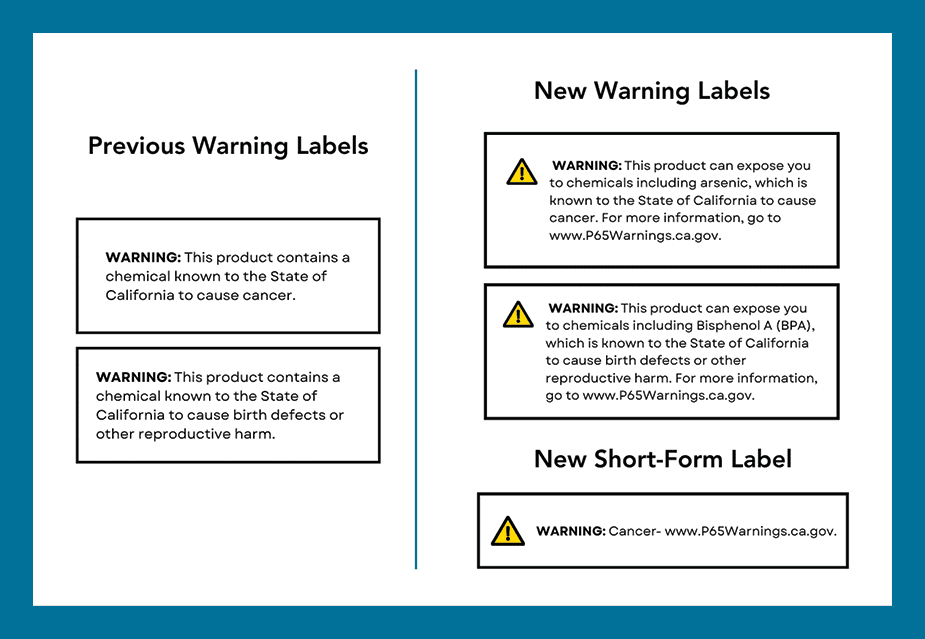You may have noticed a sticker on many products that reads “WARNING: Cancer and Reproductive harm”. This sticker can cause anxiety or raise questions in the minds of end users. For example, “are these items still safe?” We’re here to answer all your questions and provide insight behind California Proposition 65.
According to the OEHHA website, “Proposition 65 requires businesses to provide warnings to Californians about significant exposures to chemicals that cause cancer, birth defects or other reproductive harm.” The California Office of Environmental Health Hazard Assessment (or OEHHA) is the organization that manages Proposition 65 and the list of chemicals known in California to cause cancer, birth defects, and reproductive harm. When California Proposition 65 was voted into law in 1986, their list originally contained 30 chemicals. Now, there are over 900 listed. You can see that list here: https://oehha.ca.gov/proposition-65/proposition-65-list
What Chemicals are on the List?
Some of the included items on the OEHHA list are synthetic and natural chemicals, such as BPA, formaldehyde, and asbestos. Other items include medications and even food products themselves.
You could find a Prop 65 warning on rice, which can absorb arsenic from soil. Certain shellfish and seafood can contain cadmium and mercury. While harmful in large quantities, arsenic, cadmium, and mercury naturally occur in the growing and harvesting process of our food. It’s important to remember that Prop 65 warnings indicate a presence of certain chemicals, not the quantity.
The Issue with Coffee

This has caused some issues as the law has grown over the years. If you walked into a Starbucks in California before 2019, you may have seen this sign with a Prop 65 warning for coffee. While coffee itself isn’t hazardous, acrylamide can be. Acrylamide is a chemical used in textiles, makeup, and plastics. It’s also forms in some food during the frying, roasting, and baking process (including fries, crackers, breakfast cereals, and canned olives).
Since coffee beans are roasted before grinding, they contain acrylamide. Since acrylamide is a substance that correlates with cancer, it’s hard to specify a safe amount. However, there have been many studies on the effects of acrylamide in coffee, which have produced conflicting results on if it poses a danger at all. Regardless, Starbucks was legally obligated to post Prop 65 warning signs in their California stores simply because acrylamide was present. After much litigation, OEHHA found that coffee bean roasting does not pose a significant risk of cancer and issued an exemption.
Image Credit: Wall Street Journal
I’m Not Located in California. Do I Still Need These Warnings on my Products?
It’s important to consider the possibilities of where your promo products may end up. You may not need these warning labels in other states, but there’s always a chance you could attend trade shows or events in California. Because the warning labels are there to keep consumers informed, anyone in any state can benefit from them.
The warnings also need to cover exposure to those chemicals at any point in the supply chain, from manufacturer to customer. Fines can also be significant, with up to $2500 per piece per individual product per day. With promo product quantities racking up into the hundreds or thousands, failure to comply could lead to a substantial amount of money. Because testing all products can be costly, sometimes products will be labeled with a Prop 65 warning as a precaution.
What Types of Proposition 65 Labels are There?
Proposition 65 is an evolving mandate and has undergone a few changes, most notably in 2018. This mandated that warning labels needs to list the full chemical name responsible for the label, along with its corresponding risk of harm (cancer, birth defects, and/or reproductive harm).
The warning label also needs to include a yellow symbol and directions to the OEHHA Prop 65 warning website: www.P65Warnings.ca.gov. If the product or packaging includes languages other than English, then the warning label must also be in those languages. Products were also grandfathered in if they were manufactured prior to 2018 and could contain warning labels with less information.
The only other exception to the 2018 changes is for products that are too small for a label with that much information. Those products are allowed to have a “short form” version.
This change also took notice of the many ways we could buy products and mandated that catalogs and product web pages now needed to include warning information.

What Does This Mean for Promotional Products? Are They Safe?
Proposition 65 isn’t exclusive to promotional products and are as safe as other products you might purchase at retail. Proposition 65 simply requires products that could have had contact with some amount of hazardous material to be labeled as such.
TK Promotions regularly takes steps to educate our staff on Proposition 65 and other industry safety standards, including becoming Product Safety Aware certified through Promotional Products Association International. We also partner and align ourselves with reputable vendors who supply us with the highest quality products. We’re committed to the safety and reputation of our clients and strive toward delivering great products, education about the industry, and building long-lasting relationships.
Have questions or want to learn more? Contact us!


